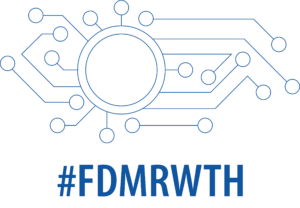Source: orcid.org
More than 14 million ORCID iDs already exist worldwide (source: orcid.org).
What the ORCID iD is, what advantages it brings you in your everyday research, as well as further information about its use at RWTH Aachen University can be found in this blog post.
What is ORCID?
ORCID (Open Researcher and Contributer ID) stands for an identification system for authors of scientific works. It was founded in the early 2010s as an international non-profit organisation and has developed into a de facto international standard for the unique and persistent identification of all persons involved in research and publication processes. ORCID is also receiving more and more attention in Germany through the DFG-funded project “ORCID DE“, which is promoting its dissemination and implementation at German universities.
The ORCID iD designates an alphanumeric code that enables a globally unique and permanent personal identification. This is important because names are not always unique, are used in different spellings and can change, for example, through marriage. For this reason, various providers have established their own author IDs, e.g. the Web of Science ResearcherID or the Scopus Author ID. The ORCID iD now has the great advantage of being institution-independent, non-commercial and community-based.
What concrete advantages does ORCID iD offer you in everyday research?
With ORCID iD, you can clearly identify your scientific works, such as classic publications, research data and other resources, as yours and permanently link them to your person, your name and your scientific career. The digital ID, which is free of charge, remains valid even if you change your name or employer and can thus be used throughout your entire academic career, regardless of country or institution. This facilitates the maintenance of publication lists and promotes the visibility and thus the recognition of your scientific achievements. Incorrect assignments of publications are prevented.
You have sovereignty over your data. You maintain your ORCID profile independently, determine yourself which information is recorded there and control the visibility from private to a selected group of people to publicly visible.
The ORCID profile thus offers you a place, controlled by you and independent of the institution, to maintain your entire publication output and also to make visible information on your education, your professional activities, research funding, reviewer activities, committee work and memberships.
The administrative effort is kept within limits, as many workflows have already been implemented to automatically fill your ORCID profile and keep it up-to-date. So make it easy for yourself and allow trusted organisations to access your ORCID record to automatically populate it with your publications and read out further contextual information that contributes to the interconnectedness of the data.
In addition, more and more scientific platforms, such as Coscine (see below), also allow access via ORCID iD.
ORCID at RWTH Aachen University
RWTH Aachen University is a member of the German ORCID consortium and is committed to the use of ORCID iD.
RWTH Publications provides a quality-assured data source for the RWTH’s scientific output. The RWTH Publications department formally edits and enriches the data. In RWTH Publications, the identification of persons is carried out via the IDM personal standard set. This record contains information on different spellings of your name, your email address, your institute affiliation, further author IDs and publications confirmed by you. Link your personal IDM personal data set to your personal ORCID profile to fill it with the quality-checked metadata from RWTH Publications. You can find out how to create a personal standard record in RWTH Publications and link it to your ORCID profile in the video “Author identification at RWTH Aachen University”.
On the research data management platform Coscine, the ORCID iD can be used for logging in. This makes access easier for external users, as they do not need an RWTH ID, and you still have access even if you have left RWTH. In order to be able to fully use Coscine as a RWTH researcher regardless of the log-in method, you should link your ORCID profile in the Coscine user profile. You will find a link to the instructions on the IT Center Help pages.
Why is ORCID important in the context of RDM?
Persistent identifiers (PIDs) are a key concept in research data management. The ORCID iD is one of the most important PIDs in the research world, along with the DOI (Digital Object Identifier). They allow the reliable and machine-readable referencing of resources and thus contribute to the sustainable findability and reusability of research data. Furthermore, they can link resources via stable links and thus support concepts such as Linked Open Data.
Have we convinced you?
Register with ORCID and benefit from the advantages ORCID iD offers you!
Link your person standard record in RWTH Publications with ORCID so that you can easily fill your ORCID profile with the quality-checked data of RWTH! Also give other DOI registration agencies (e.g. Crossref or DataCite) permission to enter publication metadata in your ORCID profile.
Benefit from unique identifiability. Enter your ORCID iD whenever possible, e.g. when submitting manuscripts, conference papers or publishing research data, and help to network the research landscape and make it future-oriented, i.e. also automated and machine-readable!
Learn more
The RWTH Publications Department of the University Library will be happy to assist you with questions about ORCID and RWTH Publications. If you have general questions about RDM or Coscine, please contact the ServiceDesk.The RDM team looks forward to hearing from you.
A comprehensive FAQ covering all questions about ORCID can also be found on the ORCID website. (*)
______
Responsible for the content of this article are Ute Trautwein-Bruns und Lina-Louise Kaulbach.





Leave a Reply
You must be logged in to post a comment.